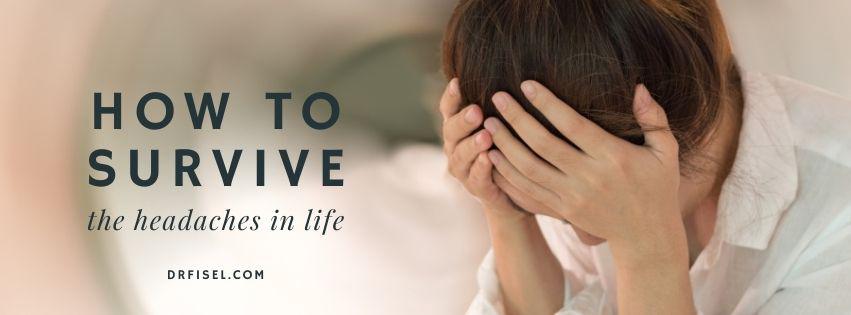
Is it the eyestrain of staring at a computer screen all day?
Or, maybe it is the stress of a deadline that seems impossible to meet?
Even when the cause is hard to pinpoint, you can feel that tension headache creeping up and…
YOU KNOW
what it is going to feel like when that dull sense of pain takes residence between your temples!
Then there are the much more pervasive and troublesome types of neurological disturbances…
MIGRAINES!
Picture the kind of ache in your head that keeps you in bed, lights off, whispering, for hours if not days.
They are more than just headaches; they can often feel unbearable.
Headaches and migraines come to us for a myriad of reasons. Already mentioned were EYESTRAIN and STRESS, but there are other common causes that you may not have considered (SOURCE):
- Stress
- Emotional distress
- Hormonal imbalance
- Certain foods or food allergies
- Environmental exposures,
- Infection
- Constipation
- Blood pressure issues
- Drugs and Alcohol
- Fatigue
- Eyestrain
- Nutritional deficiencies
- Dehydration
What creates a headache for one person may result in a migraine for another. There are so many factors to consider that it cannot be reduced to a one size fits all diagnosis and solution.
“As a neurological ailment, [headaches and] migraines impact the whole person, not just the head, so it follows that treatments are based on whole-person assessment, understanding and treatment.” (SOURCE)
Western medicine addresses the alleviation of many symptoms. In our headache and migraine survival guide, we would like to offer some complementary therapies from a naturopathic perspective.
Common headaches are often called tension headaches. It follows that STRESS MANAGEMENT is an important tool in relieving tension from the body.
There are a few things you can try if you suspect tension or stress may be at the root of your headache or migraine:
- Practicing Mindfulness – as you feel the onset of a headache or migraine, simply notice the tension in your mind and body and give yourself permission to relax in those areas.
- Breathing Exercises – in the most stressful moments, when you know a headache is imminent, try the “Box Breathing” pattern by inhaling for 4 counts, holding for four counts, exhaling for four counts, and then holding for four counts. Repeat as needed.
- Movement – try simple exercises such as stretching at your desk, taking a break at lunch for an in person or online yoga session, or simply taking a walk around the block can be helpful.
During the pandemic, you might have found yourself typing away on your laptop from the couch.
Did you know that BODY POSITIONING and alignment of the spine can affect the level and frequency of headaches and migraines?
Naturopathic doctors are trained to assess and correct physiological issues in your bodily structure that may be a contributing factor when you experience headaches or migraines.
- Massage – assists in relaxing tense muscles
- Manipulation/ Adjustments – assures that head, spine and skeletal structure are in alignment
- Acupuncture – increases blood flow and calms the nervous system
Systemic inflammation plays a detrimental role in overall wellness and how a body feels. Therefore, it is important to pay proper attention to your needs in terms of NUTRITION in order to prevent and/ or eliminate headaches and migraines.
The following are a few suggestions that may assist you in doing just that:
- Hydration – adequate hydration fluctuates from person to person, but staying hydrated makes a difference in preventing headaches and migraines.
- Anti-Inflammatory Diet – a diet rich in omega-3 fatty acids from nuts and wild caught fish, lots of fresh fruit and vegetables, lean protein and healthy fats reduces the likelihood of headaches and migraines
- Herbs/ Supplements* that are known to reduce headaches and migraines:
Vitamin B-2 (riboflavin) – has been shown to reduce migraine symptoms and has long been used as a supplement option
Magnesium – often times those that suffer from headaches or migraines are found to have low doses of magnesium in their blood stream.
Feverfew – a member of the daisy family, feverfew is an herb that can be ingested and has shown to be useful in the treatment of headaches and migraines.
*Always consult your naturopathic doctor before introducing herbs or supplements to your diet.
Although there are very valid and useful treatments offered by western medicine, a naturopathic perspective can be beneficial in getting to the root cause of your symptoms for headaches and migraines.
Dr. Fisel can help you find natural solutions and relief if you are battling with problematic headaches or migraines. If you live in the Guilford/ Branford/ New Haven/ Madison/ Clinton area and would like to learn more about the innovative programs Dr. Fisel has to offer, call (203) 453-0122 or CLICK HERE to schedule your consultation.
RESOURCES:
https://aanmc.org/featured-articles/naturopathic-approaches-to-headaches/
https://naturemed.org/natural-relief-for-migraine-headache-symptoms/



